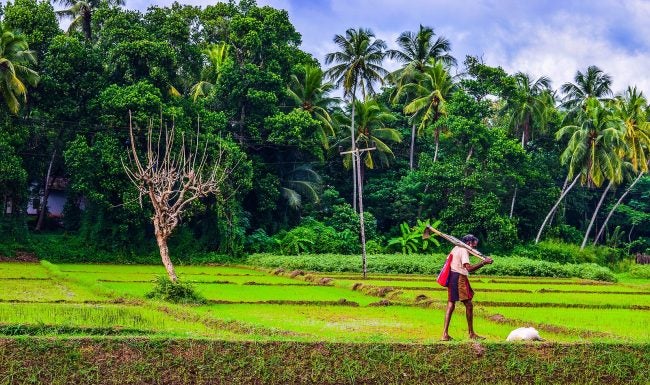Summary
On 14 December 2021, the Sri Lankan government announced that it had decided to pay a whopping US$6.4 million (S$8.7 million) to a Chinese fertiliser company that had shipped a disputed fertiliser consignment to Colombo. While the incident provides insights into the Sri Lankan government’s failed policymaking, it also sheds light on the plight of a small state in dealing with powerful countries in resolving diplomatic issues.
Background
In April 2021, Sri Lanka’s President Gotabaya Rajapaksa imposed a complete ban on the import and use of chemical fertiliser, becoming the first and only country in the world to impose a blanket ban on chemical fertiliser overnight. Citing health risk presumably caused by the use of and the exposure to chemical fertiliser, the president stressed that lives are more important than high yield.
Despite concerns raised by various quarters on the impracticality of an overnight blanket ban, the government proceeded with the plan. It demanded an increase in domestic organic fertiliser manufacturing to meet the required need by September. The overnight ban plunged the farmer community into distress. Chemical fertilisers and pesticides traders and companies continued to hoard the already available fertilisers, creating a shortage in the country. In protest, the farmers took to the streets, complaining of fertiliser shortage. Despite the government’s call for the rapid increase in domestic organic fertiliser production, the organic fertiliser manufacturing companies stated that the total amount of organic fertiliser required for Sri Lanka’s total agriculture production could only be produced within a few seasons. It was revealed that carbonic fertiliser could be produced only for 224,000 hectares at the moment. Accordingly, the government turned to importing organic fertiliser for 1.1 million hectares of farmland.
Fiasco with the Chinese Company
Upon a call for international suppliers, a Chinese company, Qingdao Seawin Biotech Group Co Ltd, won a tender to supply 99,000 tons of organic fertiliser for Sri Lanka. The first consignment arrived in the country in September 2022, with 20,000 tons of organic fertiliser. The fiasco began when the National Plant Quarantine Service (NPQS) found that the consignment was contaminated with living organisms and unsuitable to be used in Sri Lanka, hence being harmful for Sri Lankan soil. State-owned Ceylon obtained a commercial High Court order to prevent the bank from making any payment based on the already issued Letter of Credit. The Chinese company was told that the shipment could not be accepted.
In retaliation, the Chinese Embassy in Sri Lanka called for an international inspection of the shipment. The Economic and Commercial Office of the Chinese Embassy in Sri Lanka blacklisted the People’s Bank of Sri Lanka which defaulted the payment. The Chinese company also issued a statement denying allegations of finding plant pathogens and emphasising that “unscientific detection method and conclusion of NPQ in Sri Lanka do not comply with international animal and plant quarantine conventions.” The company also launched an international arbitration procedure in Singapore demanding US$8 million (S$10.9 million) as compensation for the loss of reputation, goodwill and future business prospects.
Observations and Reflections
The fiasco has created significant damage to Sri Lanka-China trade and diplomatic relations. China is Sri Lanka’s second largest trading partner. In the last decade, of the total value of imports from China to Sri Lanka, only between three and five per cent consists of fertilisers. This is based on calculations from the World Integrated Trade Solutions of the World Bank. However, this import amounted to almost 49 per cent of total fertilisers imported by Sri Lanka. Thus, fertiliser from China has played a significant role in Sri Lanka’s agriculture industry. Further, the issue has impacted Sri Lanka’s banking industry. The Chinese embassy accused the Sri Lankan bank of causing financial losses to the Chinese enterprise in international trade with Colombo. It called on other Chinese enterprises to avoid banking with the institution. This could lead to creating distrust in Sri Lanka’s banking and financial system is not only in China but also in other countries.
The diplomatic tension caused by the issue has proved that Sri Lanka-China “unwavering” friendship will always not be resolute as the two countries claim. It also proves Sri Lanka’s inability to withstand pressure from China given its increasing dependency on the Asian power. This is proven by Sri Lanka paying 75 per cent of the compensation claimed by the Chinese company. Hence, this calls for Colombo’s course correction in its foreign policy and for it to adhere to its “neutral” foreign policy. As a small country with compromised economic independence, Sri Lanka increasingly loses its options to navigate big players strategically. The greater its dependency on a powerful player, the more it is likely to lose its ability to stay neutral and make policy decisions to protect its interests.
The diplomatic impact of this incident also has repercussions for China. At the outset, it seems that China has won the case against Sri Lanka. However, the incident has fuelled criticisms of China’s increasing assertiveness against a small country. Recalling how Gotabaya had to backtrack on his decision to re-negotiate the Hambantota Port deal, critics point to China using its muscles to impose pressure on small countries. Amid rising global tension against China and criticism on its benignity, the incident further supports and provides ammunition to China critics.
. . . . .
Dr Chulanee Attanayake is a Research Fellow at the Institute of South Asian Studies (ISAS), an autonomous research institute at the National University of Singapore. She can be contacted at chulanee@nus.edu.sg. The author bears full responsibility for the facts cited and opinions expressed in this paper.
Photo credit: Wikimedia Commons
-
 More From :
More From :
-
 Tags :
Tags :
-
 Download PDF
Download PDF



